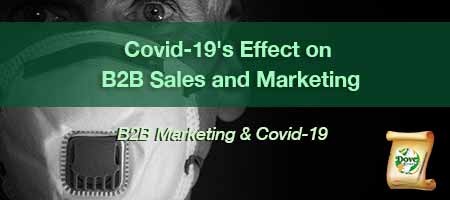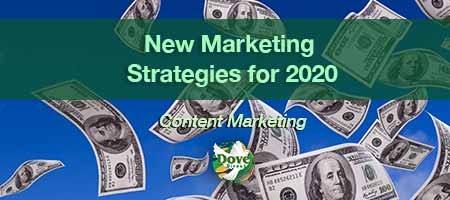Covid-19's Effect on B2B Sales and Marketing
Welcome to the Dove Direct Print and Marketing Blog. Today's post, "Covid-19's Effect on B2B Sales and Marketing," examines essential evolutionary pivots that determine how B2B organizations are managing consumer interaction with brands. Since 2020, we have tracked changing consumer habits related to the pandemic's ongoing effects, from the original strain to the current variant. What we notice first and foremost is that marketing is in a state of flux. Evolving marketing strategies, including up-to-the-minute tactical approaches during these variant mutations, have now become the norm.
While the term "new normal" and the companion phrase "post-pandemic," is often spoken, we note that there is no new normal. As new variants continue to appear, resulting in a prolonged recovery, scientists, enterprises, and academia continue to try to get a foothold ahead of the disease. Simultaneously, some aspects of the current norm related to consumer requirements are similar to the traditional approaches. For example, organizations will always focus on people, prospects, customers, partners, and suppliers. That is to say, how can organizations improve the stakeholder experience. Institutions the world over are doing their best to mitigate, if not outfox, the pandemic. In short, the SWOT analysis continues to be a helpful tool for analyzing business operations with the ability to identify and resolve the impact of new threats while capitalizing on new opportunities. Navigating the ebb and flow of this environment and consumer sentiment toward societal changes and the values spectrum is key to addressing buyer behaviors.
Our Quote of the Day: "In B2B, people don't buy for pleasure. They buy to alleviate pain. Alleviating pain brings them pleasure."
— Tamara McLeary, CEO, Thulium.co
McKinsey & Company Findings
The impact of Covid-19 on B2B sales was recently surveyed and reported by McKinsey & Company. For brevity's sake, we will limit the extensive data collection and focus on several key findings and trends excerpts from the report, including:
- Most B2B seller interactions have moved to remote or digital.
- 70% of B2B decision-makers say they are open to making new, fully self-serv, or remote purchases.
- Customers have made it clear that they now prefer video to phone communications.
- Nine out of 10 decision-makers surveyed globally optimistically state that the new digital go-to-market sales practices developed during COVID-19 will be a fixture beyond 2021.
- 62% of respondents report that they now conduct more than half of the buyer's journey online before speaking with sales.
One clear aspect from the McKinsey report is that B2B marketers are now fully engrossed in purchasing via digital with a high emphasis on video communications versus telephone calls. Although digital growth and usage are skyrocketing, keep in mind that traditional marketing and advertising are still the premier B2B go-to marketing strategy.
The Value of Traditional Marketing
Print marketing is principally known as a visual marketing strategy, and it is effective in various mediums such as newspapers, magazines, posters, billboards, brochures, journals, booklets, and other printed products.
In the B2B world, specific informational business magazines and peer-review journals have demonstrated great success as B2B prospects value and read them. When it comes to outdoor, which includes billboards, the medium is particularly successful, providing the best budget-friendly location and a steady and high traffic flow. Tactile collateral such as brochures also works well, mainly when used in conjunction with billboards. This type of tactic is most effective, for example, when an automobile manufacturer invests in a billboard located near the auto brand's dealers. Owning the strip, so to speak, is a competitive edge in the form of an alternative decision for automotive prospects while driving in the area. If the auto manufacturer is engaged in an auto show, having brochures to hand out at the event further cements what targets have seen from the billboards. This form of marketing, billboard, dealers, and pamphlets or brochures, represent traditional marketing that creates competitive mindshare.
Telephone Marketing
When sales execs and managers bring up the subject of cold calling via telephone marketing, one might hear moans and groans from the sales execs, as they know that cold calling really can be rearview mirror selling. Cold calling is generally seen as an invasive tactic of pressure selling and can resort to aggressive sales behavior, turning prospects off. Still, some businesses will resort to cold calling when looming goal deadlines encroach upon the company's bottom line. Some sales team leaders feel that cold calling is still a win for their business, especially if the exec reaches a decision-maker. However, if the cold call alienates the decision-maker in any manner, the resulting effort could negatively stain the prospect's view of the business organization. That said, telephone marketing can be very effective when the brand or sales exec has a previous interaction with the decision-maker, or the brand has pre-marketed to the prospect's organization with an introductory direct mail piece, such as a postcard or brochure. However, in the event of previous communication, a follow-up telephone marketing call can be very fruitful. These calls allow the brand exec opportunities to discuss new product launches or updates to existing product lines. That type of information is often valuable for buyers, decision-makers, and prospects.
If you're going for the win, it is a best marketing practice to avoid cold calling. As it is not in the best interest of the brand representative to try and communicate with a prospect or a lead where the contacted person does not personally know the rep, the cold call may run the risk of imparting a less than stellar impression on the business.
Direct Mail Marketing
Marketers can carry out this type of marketing in various print treatments such as postcards, letters, catalogs, mailers, brochures, flyers, and more. B2B businesses use direct mail marketing broadly across a range of B2B sectors such as Google, AT&T, Infiniti, digital start-ups, and the list goes on. Any B2B organization searching for a near-fail-safe marketing strategy to deliver added engagement and increase response rates should strongly consider direct mail marketing. Direct mail is the one medium that provides timely information depicting the company's value to the exact recipients on the target list. Nevertheless, many marketers continue to place direct mail marketing in the "old school" bucket.
However, old-school tactics that have been tried and proven true continue to hold great value as the world evolves. For example, the basketball greats of yesteryear and their distinct on-court moves are continually studied by today's great players, from Kobe Bryant, Shaquille O'Neal, and Michael Jordan, to now LeBron James and Steph Curry. Similarly, direct mail marketing continues to be the stalwart player in the game of advertising and marketing. The numbers back up this claim, as data compiled by the Go Inspire Group reported that direct mail campaigns resulted in purchases that were five times as large when compared to email marketing strategies.
Broadcast Marketing
Broadcast Marketing represents an age-old audio-visual marketing strategy that imparts visual communication employing broadcast mediums with television, radio, theatre screen advertisements, sporting venues, streaming, and cable subscription services.
Broadcast marketing may miss the mark as an alternative for a superior B2B marketing option for business targets. However, suppose a B2B brand selects a highly rated television program or radio broadcast to target prospects. In that case, the odds are strong that a CEO or C-Suite executive watching or listening to that broadcast may not look for or find vital product information during the broadcasts to help solve a challenge. Therefore, the opportunity decreases that a broadcast B2B advertisement will reach enough targets to justify the ad spend. Therefore, reaching targets that don't fit the brand's objective can result in wasted dollars, not to mention creative costs, time, and resources.
Conversely, some huge B2B players use network television, such as AT&T, IBM, Xfinity, USPS, UPS, and others, although they have expanded budgets and can successfully campaign in the broadcast medium.
Alternative Marketing
Marketers have always created and tried outside-the-box marketing strategies, and the list is wide and varied. However, keep in mind that this approach relies on personalization that addresses organizations' challenges and pain points on the target list. Some of these creative alternative marketing strategies include in-person or hybrid conferences, guerrilla marketing campaigns, sponsorship investments, specially planned meet-ups, workshops, transpromotional campaigns, affiliate sponsorships, referral marketing campaigns, and more. B2B businesses have enjoyed the results of both referral and affiliate marketing techniques when creatively applied. The ideas are endless.
Now that we've presented traditional marketing basics, we will dive straight into B2B digital marketing next time when we review the moving business universe and its attempt to catch up to B2C marketing. We hope you will join us, so stay tuned!
The Net-Net
The aforementioned marketing strategies and tactics continue to play a vital role in navigating the era of Covid-19 and its effect on B2B sales and marketing. While we covered a condensed view of several marketing strategies, our next post will dive into digital marketing aspects that are winners for B2B marketing. Thanks for reading "Covid-19's Effect on B2B Sales and Marketing."
Let's talk about integrated business solutions and how they can move your messages forward, help grow your business, change behavior, and improve the customer experience. Let us show you how to improve your document processes to optimize your workflow, reduce costs, and maximize your organization's printing, letter shop, and mailing capabilities.
Dove Direct has an official USPS certified bureau located within our offices to save you time and money. We can even create a demo file for you. For more information, call Carla Eubanks at 404-629-0122 or email Carla at This email address is being protected from spambots. You need JavaScript enabled to view it..
Dove Direct, your Atlanta vertical integrated print and mail solutions provider, offers organizations end-to-end data, printing, and mailing solutions:
- Data Management
- Variable Digital/Data Printing
- LetterShop and Fulfillment
- Digital Mail Scanning Services
- Fully Automated MLOCR Presort Bureau
- Marketing and Production Management Support
- Secure Data Life Cycle Management
If you don't want to wait, you can reach Dove Direct today by calling 404-629-0122 or complete the Contact Form.





